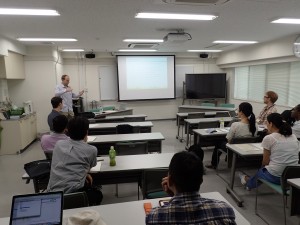On July 30, 2015, the Division of Natural Resource Economics, the JGP Social Sciences & Humanities Sub-unit, and the Research Institute for Humanity and Nature (RIHN) jointly organized a special seminar by Dr. Maki Hatanaka and Dr. Jason Konefal, who were both from Sam Houston State University, USA.
The details of the seminar are as follows:
[Time & Date] 14:00- 17:00 Thurs. 30 July 2015
[Venue] Room E217 (the Natural Resource Economics Division’s meeting room No.1), Faculty of Agriculture Main Bldg., North Campus, Kyoto University
[Speakers & Talk Titles]
- Dr. Maki Hatanaka (Associate Professor, Department of Sociology, Sam Houston State University)
“Governing Shrimp Aquaculture: Private Governance, Ethics, and Social Change”
[Abstract] Much of regulation has shifted from government to governance in many economic sectors. Consequently, the use of standards, certification, and accreditation is becoming common regulatory approaches globally. For food and agriculture, the shift to private governance is affecting how regulations are made, the kinds of regulations are enacted, and ways that regulations are enforced. These changes in how food and agriculture are governed have significant ethical implications for society. However, much remains unknown regarding private governance’s potential and limitations, particularly with respect to its ethical consequences. This includes how private governance is affecting democracy, justice, and accountability. Using the case of an organic shrimp aquaculture project in Indonesia, this presentation will focus on ethical questions in (1) the standard-development process, (2) the conformity-assessment process, and (3) on-ground impacts of private governance. In concluding, my findings raise questions regarding the effectiveness of private governance as agrifood policy tool and regulatory mechanism.
- Dr. Jason Konefal (Associate Professor, Department of Sociology, Sam Houston State University)
“Multi-stakeholder Governance and Agricultural Sustainability: Lessons from the United States”
[Abstract]Multi-stakeholder governance has emerged as a leading institutional approach for increasing sustainability globally. Congruent with this global movement, there has been a proliferation of multi-stakeholder initiatives to develop sustainability metrics for United States agriculture. This presentation examines the three most prominent initiatives: Field to Market, the Stewardship Index for Specialty Crops, and the National Sustainable Agricultural Standard. Two sets of analyses are presented. First, the ways that that legitimation politics in multi-stakeholder governance may influence the metric-development process is examined. Second, how each initiative has conceptualized agricultural sustainability is analyzed. Findings from this research indicate that multi-stakeholder governance is channeling United States agriculture towards a weak program of sustainability focused on eco-efficiencies. In concluding, the implications of these findings for multi-stakeholder governance and sustainability transitions generally are discussed.
To view the flyer for the seminar, please click here: Seminar_July 30_flyer
[Event Report]
The special seminar attracted 16 participants from the Graduate School of Agriculture, the Graduate School of Economics, and the Research Institute for Humanity and Nature (RIHN). The guest speakers Dr. Hatanaka and Dr. Konefal provided interesting and stimulating talks on the issue of governance for sustainable agriculture, which provoked lively discussion among the participants.




